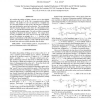Free Online Productivity Tools
i2Speak
i2Symbol
i2OCR
iTex2Img
iWeb2Print
iWeb2Shot
i2Type
iPdf2Split
iPdf2Merge
i2Bopomofo
i2Arabic
i2Style
i2Image
i2PDF
iLatex2Rtf
Sci2ools
ICASSP
2011
IEEE
2011
IEEE
Discrete regression methods on the cone of positive-definite matrices
We consider the problem of fitting a discrete curve to time-labeled data points on the set Pn of all n-by-n symmetric positive-definite matrices. The quality of a curve is measured by a weighted sum of a term that penalizes its lack of fit to the data and a regularization term that penalizes speed and acceleration. The corresponding objective function depends on the choice of a Riemannian metric on Pn. We consider the Euclidean metric, the Log-Euclidean metric and the affine-invariant metric. For each, we derive a numerical algorithm to minimize the objective function. We compare these in terms of reliability and speed, and we assess the visual appearance of the solutions on examples for n = 2. Notably, we find that the Log-Euclidean and the affine-invariant metrics tend to yield similar—and sometimes identical—results, while the former allows for much faster and more reliable algorithms than the latter.
Related Content
| Added | 21 Aug 2011 |
| Updated | 21 Aug 2011 |
| Type | Journal |
| Year | 2011 |
| Where | ICASSP |
| Authors | Nicolas Boumal, Pierre-Antoine Absil |
Comments (0)

